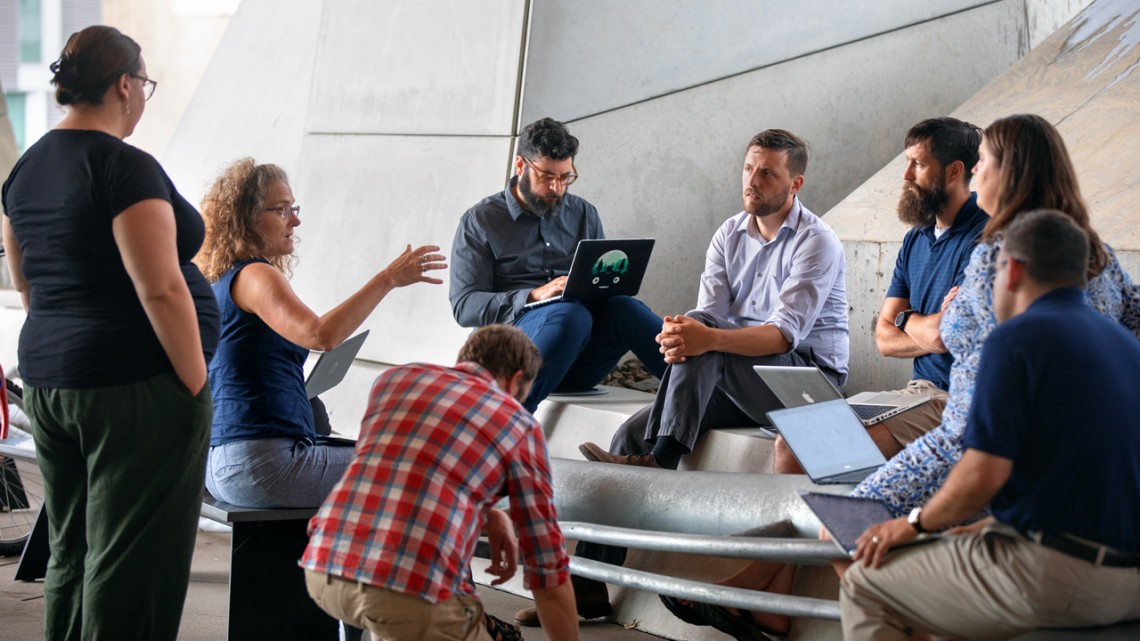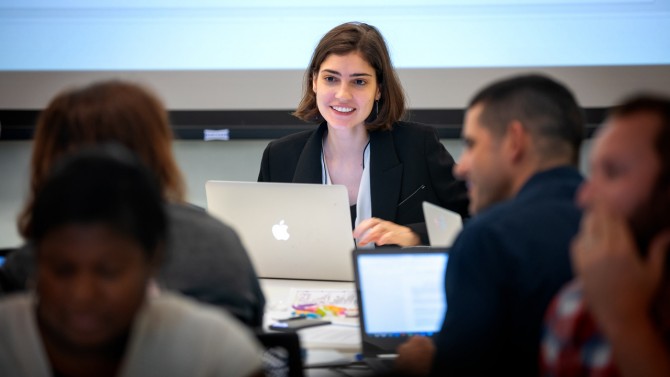
Teachers from New York state school districts discuss computer science education at a workshop July 23 at Gates Hall.
Educators explore how to bring computer science learning to all students
By Melanie Lefkowitz
Some teachers have incorporated computer science into their lessons, but what about the students who don’t have those teachers? Many schools offer coding classes, but what about the students who don’t sign up for them? How helpful is an after-school robotics club if students without transportation can’t participate?
Ensuring that all students have equal access to computer science learning was among the chief challenges addressed at a July 23-24 workshop in Gates Hall for educators from four New York state school districts. The districts are participating in CS Visions, a two-year project led by CSforALL and New York University, to develop consistent, meaningful computer science curricula – an outgrowth of similar work and relationships begun by Cornell Tech.
“These great stories help us really understand the challenges faced by school districts as they try to implement rigorous K-12 curriculum,” said Leigh Ann DeLyser, co-founder and managing partner of the CSforALL Consortium, which includes Cornell Tech.
At the workshop, representatives from the Ithaca City, Groton Central, North Salem Central and Brewster Central school districts, as well as from the Tompkins-Seneca-Tioga Board of Cooperative Educational Services (TST BOCES) and Putnam/Northern Westchester BOCES, exchanged ideas and reflected on their progress after a year of working on CS Visions, which is funded by the National Science Foundation.
“The change in mindset is really remarkable,” said Diane Levitt, senior director of K-12 education at Cornell Tech, who convened a similar event for eight central New York districts in Ithaca last year. “Today, participants are talking about computer science with so much commitment and fluency. They’re so knowledgeable, they’re so driven, they’re so passionate about bringing this to their kids. Last year they saw the barriers more than they saw the opportunities, and that has completely switched.”
Educators said the relationship has given them access to new opportunities, knowledge and support, helping them integrate computer science learning in a thoughtful and coherent way.
“We appreciate the expertise that they bring, and how they help us hash out ideas,” said Michelle Gosh, an assistant superintendent in Brewster, in Putnam County. “We’re at the point where we don’t know what we don’t know, and they help us bridge the gap between research and practice.”
At TST BOCES, which serves vocational, special education and alternative-school students on its campus and throughout the region, the collaboration helped the district qualify for a grant from Dell. Since February, more than 1,000 students, teachers and administrators have used virtual-reality kits bought with those funds.
“It’s their reality; it’s their world. We have a lot of work to do to catch up with our students,” said Sunshine Miller, TST BOCES enrichment coordinator. “It also brings relevance and interest to the curriculum – it has the capacity to upend the curriculum.”
In Ithaca, educators are integrating computer science into the project-based learning that is already happening, said Dan Breiman, principal of Belle Sherman Elementary School. For example, first graders used an infrared camera to track wildlife on the school’s nature trail, examining the data for patterns based on variables like time, temperature and moon phase.
“With computational thinking, we’re able to solve the problem on a much higher level,” he said. “We’re not just talking about giving them more devices. We’re talking about thinking in different ways.”
CS Visions – which also supports work with 12 other New York state school districts – will inform the education CSforALL offers to districts across the country. A toolkit developed for the 2017 workshop has since been used by more than 100 school districts nationwide.
There’s no single prescription for computer science learning, DeLyser said; CSforALL’s role is to help each district figure out an approach in keeping with its own goals.
“While policy makers and industry leaders talk about computer science in terms of jobs, for elementary school principals that’s not the primary concern,” she said. “We put them through a process where they can define why computer science is important, and that sets them up to make implementation decisions rooted in their own values.”
Media Contact
Get Cornell news delivered right to your inbox.
Subscribe

